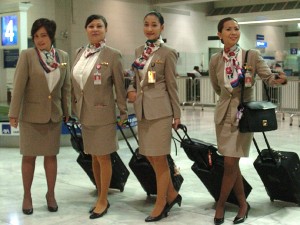MANILA, Philippines—More than two weeks after the implementation of Philippine Airlines (PAL) outsourcing program, protests from affected employees continue to hound the national flag carrier.

Philippine Airline Flight Attendants at Ninoy Aquino International Airport Centenial Terminal 2 in Pasay City. RODEL ROTONI/INQUIRER FILE PHOTO
“We’ll just wait for the Supreme Court en banc’s decision to settle the issue,” said PAL’s president Jaime Bautista in a visit at the Philippine Daily Inquirer office Tuesday night.
He was referring to the ongoing protest of members of the Flight Attendants and Stewards Association of the Philippines or Fasap at the SC, which recently recalled a ruling made by its Second Division reinstating 1,400 PAL workers.
“It’s not yet finished. Let me point out that the decision was not reversed, it was recalled,” Bautista said. The High Court’s decision fueled a collective outrage from the public, Fasap members and even Malacañang.
Ongoing assistance
On Monday, it was reported that nearly 500 former PAL employees had received their separation pay over the weekend as PAL began distributing P2.6 billion in cash benefits to those affected by the airline’s outsourcing program.
The first batch to receive their separation checks were those who had already transferred to PAL’s three service providers—SkyLogistics Philippines, SkyKitchen Philippines and SPi Global.
On Oct. 15, PAL started distributing another 1,500 checks to the second batch—those who refused to accept jobs at the service providers but did not participate in the Sept. 27 work stoppage at Naia Terminal 2.
Bautista explained it was the Department of Labor and Employment’s order to have the affected former PAL employees, which totaled to 2,359, absorbed by these service providers. Then again, around 1,000 only accepted the offer.
Joey G. De Guzman, PAL’s vice president for corporate communications said those who refused to be absorbed were those who can’t accept the lower salaries being offered by these companies.
“It’s understandable. For example, if a kitchen crew was receiving a monthly salary of P30,000 from PAL, now with the service providers, he or she is back to getting a much lower salary or minimum wage, say around P11,000 to P12,000 because he or she is starting all over again,” De Guzman said.
Bautista pointed out that part of the benefits from PAL is an extended one-year salary and medical benefits for them.
“Because we’re also not sure if those hired by our service providers will be regularized after six months. It still depends on their performance. If they won’t make it after six months, PAL will still give them an equivalent of six months’ salary,” Bautista said.
De Guzman said the affected PAL workers of the outsourcing are only those in Metro Manila and Cebu. The employees in other provincial airports were retained.
Back to normal
Michael G. Tan, member of PAL Holdings, Inc, board of directors, said prior to the strike, PAL has around 20 to 25 percent share of the market, while its sister company, the low-cost Air Philippines has 20 percent share. The leading airline remains Cebu Pacific with 45 percent market share.
“We’ve accepted that. Cebu Pacific has overtaken us since 2009. But why give up when there are solutions. We’ve always been aware of the financial conditions,” said Tan, one of the sons of PAL’s chairman and CEO Lucio C. Tan.
He assured PAL will resume normal operations on or before the third week of November or the start of the peak season.